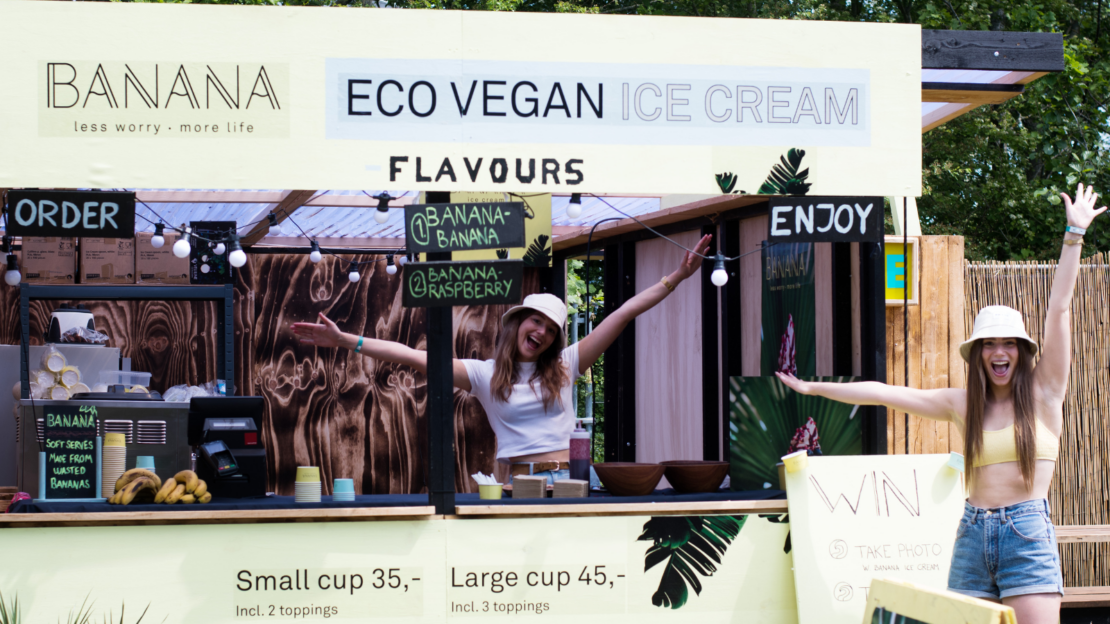In this guest blog, Vision: 2025 Steering Group member, The Nationwide Caterers Association (NCASS), share some quick wins for festival and event organisers on working with caterers to make food offerings more sustainable; diverting edible food surplus to local charities instead of landfill, considering packaging, recycling, greener energy, food sourcing and menu choices to deliver more climate friendly solutions and bring the audience on the sustainable food journey too by highlighting food choices that are better for the planet. NCASS are keen to hear event organisers’ perspectives so they can support all traders to be successful in implementing sustainable practices, contact NCASS.
“It’s unsurprising that food production is a key driver of climate change, something increasingly difficult to ignore for festival organisers looking to minimise their events environmental impact but food can be a daunting challenge.
Moving towards a more sustainable food system is increasingly a global imperative, but what can events and caterers can do to highlight, support, and deliver more climate friendly solutions to customers? Can events bring customers with them on this sustainable food journey?
There are some quick wins for festival and event organisers. Working with caterers to divert edible food surplus to local charities instead of landfill, for example, can be managed in house and is often popular with the food businesses, it simply takes a bit of co-ordination which a doddle compared to producing a show for thousands of people.
NCASS have worked with A Greener Festival for many years on the food waste initiative 8th Plate – the how to behind the 8th Plate is available to everyone free of charge and the traders at your events are the best people to support you in managing food waste initiatives. Traders don’t want food waste and having a good network of wholesalers and suppliers that are located nearby festival or event sites and setting up a collection at the end of the event can really help eliminate food waste.
Better management of resources onsite especially power and water, can offer efficiencies that should reduce if not cover overall costs. Most events sell connections rather than amounts of power. This crude approach means that not only do caterers buy more power than they need, but events then build a margin on top. Better power management could offer savings to both food businesses and events while reducing impact.
Packaging suppliers are exploring composting food waste onsite at festivals and events, creating the possibility of a more circular approach with waste food returning to the earth as nutrients rather than rotting at landfill. However, when it comes to packaging, there is often a need for commercial composting and recycling is linked to local authority’s policies and processes. With the Singe Use Plastic ban coming into effect this year, the focus on packaging is huge so working with suppliers directly to make the best solutions available to traders and to ensure consistency is even more important than ever.
The elephant, or in this case cows in the room, are ruminators. Animals that graze on grass and generate greenhouse gases while they process their food. There are also issues around how the beef or dairy is produced, with varying production methods resulting in different outcomes. Beef from a regenerative farm has a very different impact to animals bred and raised on former rain forests halfway around the world and fed on soya grown on cleared forests.
As the Green Code outlines, there should be minimum standards, practices, and targets for food & drink at events and festivals and recycling, food waste, reducing meat and dairy and greener energy are some of the fundamentals that should underpin an organisers’ approach.
Some events, like Shambala, have taken a proactive approach to delivering more sustainable food on site, by working with their caterers to switch out meat and dairy. However, this process has taken time, meaningful interactions with business owners – and relies on the good will of the ‘Shambalans’ – but they are arguably the exception not the rule.
The festival catering sector is made up of thousands of micro businesses who tend to specialise in specific cuisines or dishes, usually selling one or two products with optional variations. With around 15% of the UK population and a similar number stating a desire to become so, the market and desire for vegetarian food has never been greater, especially amongst younger people; an increasing number of the population are eating less meat, but higher quality (flexitarian). But that still leaves the majority of the population as meat eaters. As meat alternatives become more affordable and ‘meat-like’ its likely more people will switch out animal protein, more often, in future. The shift towards less meat will continue without the need to convince punters to choose pulses over meaty flavours.
One option to reduce the impact of meat being sold at the event may be to reduce the amount of animal protein on the plate. Most burgers weigh 180g, reducing them to 150g would shave 20% off the meat consumed but may not really be noticed by the consumer. When the confectionary companies reduced the size of chocolate bars to accommodate sugar restrictions, people barely noticed.
There has been huge growth in vegetarian and vegan food at festivals and there are a lot of amazing traders out there who do some of the best food in the business but there are also countless traders who have an ethical approach to meat and dairy and who have excellent relationships with their suppliers, and this is often part of their USP. More measurable and responsible sourcing will likely mean working together with suppliers to find solutions that make sense for traders without creating a negative impact on the end users when it comes to menu prices or choice.
While catering businesses will adapt to accommodate the events they want to work at, their wriggle room for making changes may be limited. It may be that the bold, proactive, and arguably top-down approach of Shambala is the way to genuinely ensure food businesses do not bring high impact products to sell on site. A number of festivals in Europe have taken to managing the sourcing of the food for the events on behalf of the caterers thus making it easier to measure the impact of the food and manage what comes on site. But this may not be possible for events with more limited resources.
However, every event or festival is different and has different criteria and focus – sustainability isn’t simple; there are often barriers to achieving an ideal outlined in a policy or procurement process and some of these barriers have become more prominent due to post Brexit supply chain challenges.
The best place to start is by working with traders to find out what is possible and support them in working with more complex elements such as labelling CO2 emissions and calculating power requirements in advance. Once traders are confident in delivering these measurements, they will be equipped to weave them into their work across all events as part of their own sustainability indicators and targets. As with all aspects of production, communication is key to getting the best out of the traders you work with – use the experience, knowledge, and expertise of the traders you work with to create the best possible working relationships and you won’t go wrong.
With rising costs across all aspects of running a food business impacting small independents across the UK, could we create a pragmatic approach when it comes to sustainability & catering? We want to make this work across the board and so would love to hear from you so that we can support by sharing information and creating tools for our members that make sustainable practices accessible and for all traders to be successful in their implementation. “
NCASS is the only membership organisation that represents festival and event caterers, they support independent hospitality businesses across the UK providing tools, systems, advice, and advocacy. NCASS is a member of the Vision 2025 advisory board and work alongside many event and festival associations including AIF, NOEA and AFO to raise the profile of the industry and find solutions to the challenges that the collective industry faces.
Photo credit: Northwood Festival by Regine Vilhelmsborg


